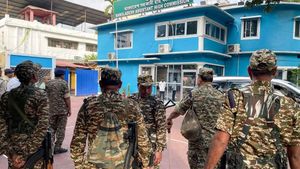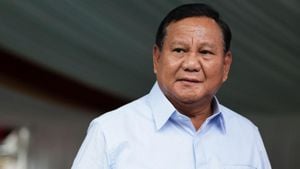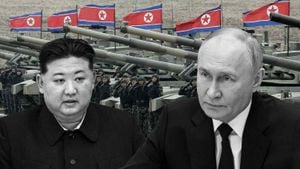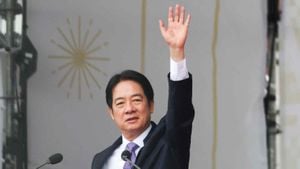Over the past week, thousands of protesters have filled the streets of Tbilisi, the capital of Georgia, engaging in clashes with police as they express their outrage against the government’s decision to suspend discussions on European Union membership until 2028. This wave of protests marks the stark confrontation between the segment of the population yearning for closer ties with the West and the ruling party, Georgian Dream, which many perceive as leaning toward Russia.
The demonstrations erupted following Prime Minister Irakli Kobakhidze's announcement, which was met with immediate backlash from those advocating for Georgia's integration with Europe. Protesters have been seen erecting makeshift barricades and firing fireworks toward heavily armed police. The Interior Ministry has reported over 200 arrests since the beginning of the unrest.
What began on November 29 has escalated each night, with scenes reminiscent of earlier revolutions—protesters confronting police using tear gas and water cannons, leading to numerous injuries on both sides. Reports have emerged of severe injuries inflicted during clashes, with some protesters alleging they were beaten upon detention. Georgian President Salome Zourabichvili has publicly criticized the violent tactics of the authorities, drawing attention to the injuries sustained by those arrested. "The majority of the arrested protesters have injuries to their heads and faces, broken facial bones, eye sockets, open wounds," she stated, addressing the brutality inflicted during the crackdown.
The protestors' demands are clear: they want to reaffirm their nation's pro-European stance, which is enshrined as part of the country’s constitutional ambitions. The unease surrounding the election results from last month—marked by allegations of fraud and suppression—has fueled public discontent. The ruling Georgian Dream party, which was founded by billionaire Bidzina Ivanishvili, has attempted to undermine the opposition's narrative but faces substantial pressure following their significant policy flip-flop.
According to political analyst Alexandre Crevaux-Asatiani of the United National Movement opposition party, this development has been anticipated as “a tipping point” for Georgia. “It looks like there is no going back. It’s kind of game over — either for us or for them,” he pointedly said, emphasizing the determination of protesters who believe they are engaged in a fight for their country's future.
Compounding the situation are accusations made by Kobakhidze, who suggested the protests were influenced by foreign powers. His administration has rejected calls for negotiations with opposition groups who have boycotted the parliament, claiming there were instigators behind the unrest. From Kobakhidze's perspective, maintaining the constitutional order is imperative, waving off accusations of deviances.
Media and civil rights organizations have faced severe scrutiny during these events, with journalists reporting violence aimed at them during their coverage of protests. The crackdown, which included arrests of protesters and alleged human rights abuses, has drawn criticism from international observers. The U.S. State Department condemned the excessive use of police force and threatened to suspend strategic partnerships with Georgia over these anti-democratic actions.
For many Georgians, the choice between closer European engagement versus continuing ties with Russia echoes historical conflicts, particularly recalling the Russo-Georgian War of 2008. Many families are divided between these views, with those supporting Georgian Dream insisting on stability and others warning of increased Russian influence.
Meanwhile, Russian officials monitor these developments closely. Dmitry Medvedev, former president of Russia, framed the protests as part of Georgia's decline, implying dire consequences if the situation devolves. The Kremlin has described the protests as internal affairs but has been quick to dismiss any claims of their interference, reflecting their overarching desire to undermine Western influences.
The opposition leaders have urged for re-elections, citing widespread electoral violations. Nika Gvaramia, head of the Coalition for Change, has been vocal about the necessity of truly free elections, asserting, "This is not merely about the elections; it’s about the heart and soul of our country. We’re facing either European integration or capitulation to Russia.”
This sentiment resonates throughout the crowd; slogans such as “No to Russia!” have become rallying cries against perceived infringements on national sovereignty. The continuous show of public force toward government establishment lays bare the stark crisis facing the state.
Across the country, solidarity is palpable; protests have spread to seaside cities like Batumi and Zugdidi, indicating widespread discontent among the populace. Activists have raised concerns over civil liberties, with reports of legal malfeasance and retaliatory actions against those exercising their rights to protest.
President Zourabichvili, who still preserves significant public support, maintains her position, urging the West for assistance and guidance during this political quagmire. “We're calling on our friends to recognize our struggle for democracy and freedom,” she stated, rallying her supporters to resist governmental overreach.
Despite the temperature hovering near freezing, protesters remain undeterred, demonstrating their unwavering resolve against what they perceive as governmental authoritarianism. International leaders and organizations, including the EU, have raised alarms about the situation, with promises of support for democratic aspirations from the Georgian populace.
What happens next remains uncertain. Continued protests could potentially fracture the current government structure, prompting discussions for redress. Political analysts suggest this could become similar to historic leadership transformations faced by neighboring Ukraine, reflecting the anxiety of regional stability within such geopolitical landscapes.
Each night, Rustaveli Avenue transforms, echoing with chants demanding democracy. The resolve of the people reflects not just discontent but embodies their quest for identity, sovereignty, and the hope for what they see as the European future they deserve.



